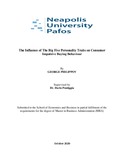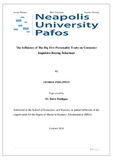| dc.description.abstract | Impulsive buying behaviour has been extensively researched over the past seventy years. Over the last decade, there has been an increasing interest into the psychological influence on impulsive buying behaviour. The objective of this quantitative study was: (1) to assess the influence of personality on impulsive buying behaviour, and (2) to assess the role of gender and their personality traits influence on impulsive buying behaviour. Personality was defined and guided by the empirical principles of the big five model of personality traits, openness to experience, conscientiousness, extroversion, agreeableness, and neuroticism. A sample of 150 adult participants, were recruited from a convenience sample and divided on the basis of gender; 75 males and 75 females. They completed three self-administered questionnaires, demographic profile, impulsive buying behaviour questionnaire, and the 50-item IPIP representation of the Goldberg (1992) markers for the big five factor structure. The data was analysed using multiple linear regression and Pearson Correlation analysis. The overall results showed that the big five model of personality explained 15.6% of the variance (F (5,144) = 6.509, p < .000. Extroversion positively (β = .322, p = .000) correlated with impulsive buying behaviour while neuroticism was inversely (β = -.352, p =.00) correlated. These two traits provided the strongest correlation and best predicted impulsive buying behaviour. Agreeableness (β = .101, p = .234), conscientiousness (β = -.008, p = .920), and openness to experience (β = -.070, p = .407) were non-significant traits. The results for the male participants showed that the big five model explained 20.8% of the variance (F (5,69) = 4.891, p = < .001. Extroversion, agreeableness and neuroticism were all significant predictors of impulsive buying behaviour in the males whilst conscientiousness and openness to experience was not significant. The results for the female participants showed that personality in terms of the big five model explained 11.1% of the variance (F (5,69) = 2.847, p = <.021. Extroversion and neuroticism were significant personality trait predictors for females impulsive buying behaviour. Whereas, agreeableness conscientiousness and openness to experience were not. In the Pearson correlation analysis, the results mirrored those of the regression analysis. For the overall and female participants extroversion and neuroticism significantly correlated with impulsive buying behaviour whilst the remaining three traits had no significant correlation. For the male participants extroversion, agreeableness and neuroticism significantly correlated with impulsive buying behaviour. Conscientiousness and openness to experience displayed no significant correlation. | en_UK |


